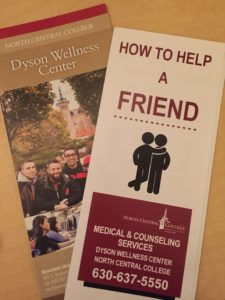Mental health can be a touchy subject. Between misinterpretations about those with mental illnesses and the many internal and external factors contributing to the state of one’s mental health, it’s normal to not completely understand the subject.
According to the Centers for Disease Control and Prevention, mental illnesses are conditions affecting a person’s functioning.
However, for Dyson counselor Tatiana Sifri, the term “mental health” is preferred over “mental illness.”

Photo by Rachel Albers
“What people typically think of when they think of mental illness is having an official diagnosis,” said Sifri. “While I might not have an official diagnosis, I certainly have my struggles, and all of my own challenges, whatever those are, that are personal to me that affect my well-being.”
There are multiple factors that contribute to the state of one’s mental well-being. These factors range from genetic makeup to significant stress to life experiences and events.
Because some of those who struggle with mental health have decreased functioning in everyday life, there is often a stigma surrounding them.
“A common fallacy that people have about individuals with mental illness is that they are likely to be dangerous or violent,” said Dr. Leila Azarbad, professor of psychology and licensed clinical psychologist. “Individuals with mental illness are far more likely to be the victim of violence than the perpetrator.”
This misinterpretation of those with mental health challenges is detrimental to their recovery.
“(It) makes it hard for those suffering to seek help or discuss their illness,” says Dr. Azarbad.
People struggling with their mental health don’t have to keep it that way.
The CDC states that those with diagnosed mental illnesses are typically treated with prescribed medication and therapy. But because mental health is very individualized, there are a variety of options to offset symptoms of mental illness and keep mental health in check.
Sifri said that while exercise, sleep and nutrition are key factors in preventative medicine, it is also important to “do things that make you feel good.”
“Connect with other human beings,” said Sifri. “There is so much research that proves over and over and over again that physically being with someone — face-to-face contact — will reduce tons of mental health issues from depression to anxiety.”
Ava Monson, ’21, agrees that making yourself feel good is a necessary step to improving mental health.
“It’s like you’re sick. If you’re sick, you wouldn’t be pushing yourself to do as much as you normally do,” she said.
Monson added, “It’s okay if you don’t get up as early as you normally do. It’s okay if you don’t get as much done as you would normally do because you are ill; you are sick. It’s a physical thing and mental thing.”

